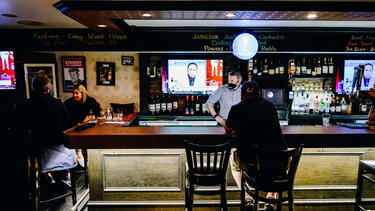Research
Could Be Worse: When You See Others Losing More, You’re More Likely to Take Risks
What induces people to take greater risks in certain situations—such as sitting at the blackjack table in a glitzy casino? A new study from Yale SOM’s Nathan Novemsky and Guy Voiche reveals that we experience losses as less painful when we see examples of bigger losses.

Can ‘Sin Taxes’ Do a Better Job?
A new study co-authored by Yale SOM’s Katja Seim examines how successful the uniform liquor tax in Pennsylvania is at generating revenue and discourage drinking, and concludes that a uniform tax leads to higher prices on products bought disproportionately in high-income areas when compared to a more variable approach, effectively subsidizing liquor consumption in low-income areas.

Did COVID-19 Restrictions on Restaurants and Bars Save Lives?
COVID-19 restrictions on restaurants, bars, gyms and salons were among the most controversial and the last to be lifted. A new study looks at whether closures, capacity restrictions, and other limits on these businesses actually lowered the death rate.

Video: Identifying with a Team Helps Prevent Stress and Burnout among Healthcare Workers
A Yale study conducted in the early days of the COVID-19 pandemic found that feeling like part of a team reduced reported stress and burnout—an insight with implications for how any kind of organization can weather a crisis.

Century-Old Harvard Records Show How Social Connections Help the Elite
A study co-authored by Yale SOM’s Seth Zimmerman, drawing on a trove of archival student records, suggests that membership in exclusive clubs propelled students from the top prep schools to higher incomes, while good grades did little to lift other students into the top-earning tier.

Social Media Is Addictive. Do Regulators Need to Step In?
Yale SOM’s Fiona Scott Morton and her co-authors argue that smarter and more robust antitrust enforcement can help, by making room for new social media platforms that promote themselves as healthier alternatives.

Does the Location of a Hospital Room Affect Quality of Care?
Using data from infrared location tracking tags, Yale SOM’s Lesley Meng and her co-authors determined that nurses visit rooms that are farther from the nurses station less frequently, but for longer.

Now It’s Personal: How Knowing an Ad Is Targeted Changes Its Impact
A consumer’s knowledge that an advertisement has been tailored to their interests changes how they respond, according to a new study co-authored by Yale SOM’s Jiwoong Shin. Firms evaluating marketing strategies should factor consumers’ inferences about targeted ads into their advertising decisions, Shin says.

Study in Bangladesh Identifies Keys to Encouraging Mask-Wearing
A team of researchers, including Yale SOM’s Jason Abaluck and Mushfiq Mobarak, tested multiple methods for encouraging use of masks in Bangladesh and identified a group of simple interventions that tripled usage.

The American Jewish Community Will Look Different in 50 Years
A new study by Yale SOM’s Edieal Pinker finds that in the coming decades, the more liberal Reform and Conservative denominations will shrink and the number of Jews identifying as Orthodox will grow.
